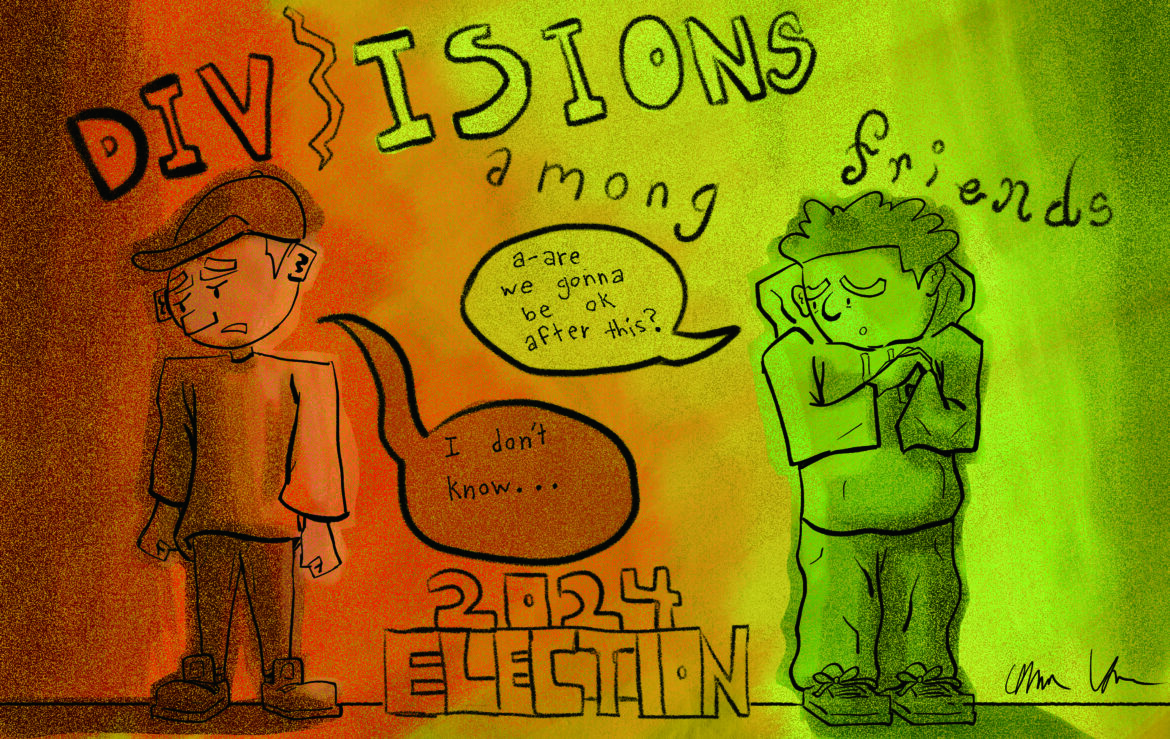This piece expresses the views of its author(s), separate from those of The Montclarion.
Since election day, I’ve noticed a recurring trend in my social media feeds: posts like, “Don’t talk to me if you voted for Trump,” or “Unfollow me if you support Trump.” While these statements may stem from frustration or disillusionment, they represent the kind of thinking that is driving us further apart.
How can we expect others to understand our point of view on key issues when we don’t even take the time to understand one another?
When we refuse to engage with those who don’t share our political views, we’re only reinforcing the very division that’s tearing us apart. Instead of seeing others as individuals, we reduce them to stereotypes based solely on their political choices.
A moderate voter who chose Harris isn’t a Marxist bent on destroying America, nor is someone who voted for Trump automatically racist or a bad person.
Many people voted for Trump because they felt the strain of a struggling economy and agreed with his message about fixing it. The other half voted for Harris because they were excited to see a strong female leader and her vision for the future, which included women’s health rights.
I think it’s crucial to remember that perspective is everything. Two good people can see the same issue very differently based on their personal experiences, which influences the lens through which they view it.
It should be noted that there will be people who are simply too difficult to engage with, those who embody negative ideas or stereotypes that are genuinely harmful. Healthy relationships and friendships should not involve people who hate you because of who you are.
Having said that, this is why open communication and respectful conversations are so important in politics.
This division is driven in large part by the exaggerated rhetoric we are fed by political candidates and others chasing clicks and views. It’s easy to get swept up in these narratives. It leads to negative feelings toward those who are perceived as voting for these “terrible things”.
Many of these “terrible things” are only so terrible because we lack the proper context to correctly understand of them, including identifying things that can’t work or just won’t happen realistically.
I was discouraged, but not surprised, to find that an overwhelming majority of respondents to a poll that FOCUS conducted this semester said social media was one of the main sources of news among us Gen Zers at Montclair State. Yikes!
It can be a useful tool. But, it’s also a breeding ground for disinformation, as well as biased takes disguised as news. Not to mention most people only follow those they agree with.
This is why conversation is the foundation for unification.
It not only gives an opportunity for debate and challenge to the ideas you hold, but also gets others to at least consider your view of the world.
The reality is, much of the country is more moderate and aligned than the political rhetoric would have us believe. But by closing ourselves off from people who we perceive as thinking radically differently from us, we miss the chance to find common ground and build mutual understanding.
It is through honest connections that we break down the stereotypes politicians love to exploit during election seasons and begin to see the shared humanity in each other.
What if, instead of diving straight into debates over policies, we started by finding common ground in other areas? Maybe we could begin by talking about music, art or sports: things that reveal the person behind the vote.
I often hear my dad, who worked in Congress many years ago, talk about a time when politicians from different parties would sit down as friends and colleagues to work together for the good of the country. For many of us in my generation, that kind of collaboration feels like a distant dream.
We need to get past this “us versus them” mentality, or we risk doing irreparable harm to both our relationships and our democracy.
So, four years from now, if we wonder why some people don’t care about our views, it’s because we never made an effort to reach out to them. And without understanding, they won’t care.
I saw firsthand earlier this semester when I attended an event hosted by the Montclair State Democratic Club that it is possible. The event could have been the type of debate where you smash a pie in the face of who you don’t agree with, but, much to my surprise, it was not. Instead, I found it to be rather civil.
Most importantly, the two participants were good friends who happened to be on opposite sides politically.
It gave me hope for this generation.
Coming together doesn’t mean we always agree. It means we are willing to listen, even when it’s uncomfortable. This kind of open dialogue is crucial if we ever hope to bridge the political divide.



